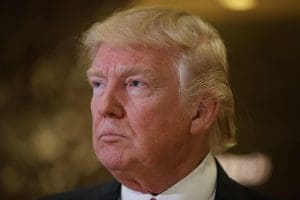What you need to know about the Trump kompromat dossier
President-elect Donald Trump and his surrogates continue furiously to try to deflect allegations that Russia possesses compromising materials it could use to influence his actions as president. Even well-meaning news media are sometimes conflating different aspects of this evolving story and using terms incorrectly. Here are the elements we know at present, as well as […]

President-elect Donald Trump and his surrogates continue furiously to try to deflect allegations that Russia possesses compromising materials it could use to influence his actions as president. Even well-meaning news media are sometimes conflating different aspects of this evolving story and using terms incorrectly. Here are the elements we know at present, as well as claims that can be refuted.
Separate and distinct parts of the story include:
1. The official, confidential in-person briefings by U.S. intelligence chiefs about the Intelligence Community Assessment (ICA) on Russian interference and hacking, “Assessing Russian Activities and Intentions in Recent US Elections,” which were presented to both President Obama and Trump, respectively;
2. As reported by CNN, the inclusion within that briefing of information about the separate but related topic of compromising materials (kompromat) possibly in the possession of the Russian government that could be used to coerce Trump once he is in office;
3. Also as reported by CNN, the use within that briefing of a two-page “synopsis” not made public and produced by the Intelligence Community (IC) from a larger document; and
4. As reported and published by Buzzfeed, the existence of that larger document — a 35 page kompromat “dossier” — which was NOT produced by the IC but rather is a compilation of “opposition research” memos created by a private investigating firm run by a former British intelligence operative, and contains unverified information about a wide variety of potentially compromising materials, some salacious (sexual behavior) and some potentially treasonous (possible coordination between the Trump campaign and the Russian government).
Misleading or false claims made about these various elements include:
CLAIM 1: Trump did not receive a brief on the kompromat. Trump’s senior advisor Kellyanne Conway made this claim to Anderson Cooper, asking in reference to the material, “Why do they not tell the President-elect about it?” She repeated her assertion on NBC’s Late Night with Seth Meyers, saying Trump was “unaware of any briefing.” NBC repeated this claim, citing a single anonymous source who asserted Trump wasn’t told about the kompromat. This is FALSE.
Director of National Intelligence James Clapper took the extraordinary step of issuing a statement that implicitly confirmed not only that Trump had been briefed on the material but that Clapper later called Trump and discussed the material again after the original briefing. Flip-flopping on her previous claim, Conway retweeted his statement in apparent endorsement.
Vice President Joe Biden also explicitly confirmed that information about the kompromat had been included in the briefings by the IC. Furthermore, as reported by sources to CNN, ABC, and even — contrary to their earlier claims — NBC, FBI Director James Comey met with Trump one-on-one to convey the information due to its sensitivity.
CLAIM 2: The U.S. intelligence community prepared the dossier. Trump himself has repeatedly attempted to link the IC with the production of the dossier. This is FALSE. As noted above, the 35-page dossier was NOT written or compiled by anyone in the U.S. IC, nor was it leaked by them. Rather, the dossier is a collection of memoranda written by a British former intelligence operative who runs a private investigation firm.
He was reportedly initially hired by Republican opponents of Trump and later by Democratic sources for the purposes of gathering negative information on Trump to use against him during the election season. (Collection of opposition research is a standard process within political primaries and general elections.) The information has been widely circulating among journalists and people working in the U.S. government for many months.
CLAIM 3: The information contained in the dossier is untrue or “disinformation.” Trump himself has repeatedly stated that the allegations contained within dossier are false and even tried to say the IC has said they are false. He has also repeatedly and bizarrely attempted to undermine the opinion of the IC by citing Russia’s claims that it does not engage in the collection of kompromat. Trump’s surrogates have reinforced this narrative.
Additionally, NBC mischaracterized the dossier as “disinformation” based on the claims of a single anonymous source, and MSNBC’s Chris Matthews hammered home that mischaracterization. (“Disinformation” is a term used to denote material disseminated to mislead and divert attention away from reality. For example: A nation might convey information about plans to attack in one location when it is actually intending to attack at a different location.) This is COMPLICATED. The IC has NOT characterized the information as untrue. That part is false.
Clapper’s own statement specifies the IC “has not made any judgment that the information in this document is reliable” or not. The dossier contains many assertions. We simply do not have full information about the veracity of the various allegations, but the most informed members of the U.S. IC found the existence of the dossier and its contents concerning enough that they felt the need to bring it to the attention of the POTUS and Trump.
DNI Clapper characterized the material as a matter that “might affect national security.” The dossier also contains many statements of generally accepted fact about the operations of Russia’s espionage and other intelligence operations.
CLAIM 4: The author of the memoranda contained within the dossier is not credible, and the dossier does not “look” right and therefore is not credible. This is FALSE. A former CIA intelligence officer who reviewed the dossier noted “the language sounds right” and commented, “The individual reports are exactly what one would expect in terms of tone and content on updates sent to a client to inform him or her what is happening in an investigation.”
As the Guardian reported in its extensive investigation, Christopher Steele, the author of the materials within the dossier, is an experienced and “highly regarded professional” from within the British intelligence community who was considered as “one of the more eminent Russia specialists” within the British Secret Intelligence Services during his career there.
Following revelations about his identity, Steele has now reportedly gone into hiding out of fear for his safety. Furthermore, Paul Wood of the BBC reported the bombshell revelation that Steele and the dossier comprised of his memoranda are not the only source of the claims that Russia has collected and maintains kompromat on Trump.
The bottom line is, no matter how much Trump rages on Twitter or conflates the various pieces to cause confusion, nor how much Conway spins the facts, this is a major story, involving the national security and the very sovereignty of the United States. And it is not going away any time soon.
Recommended

Biden campaign launches new ad focused on Affordable Care Act
Former President Trump has said he wants to do away with the popular health care law.
By Kim Lyons, Pennsylvania Capital-Star - May 08, 2024
Trump leaves door open to banning medication abortion nationwide
Donald Trump is planning to release more details in the weeks ahead about how his administration would regulate access to medication abortion, according to comments he made during a lengthy interview with Time magazine published Tuesday.
By Jennifer Shutt, States Newsroom - April 30, 2024
Biden on abortion rights: President expects to give speech Tuesday on new Florida 6-week ban
‘Having the president of the United States speaking out loud and with confidence about abortion access is a great thing’
By Mitch Perry, Florida Phoenix - April 22, 2024







































































